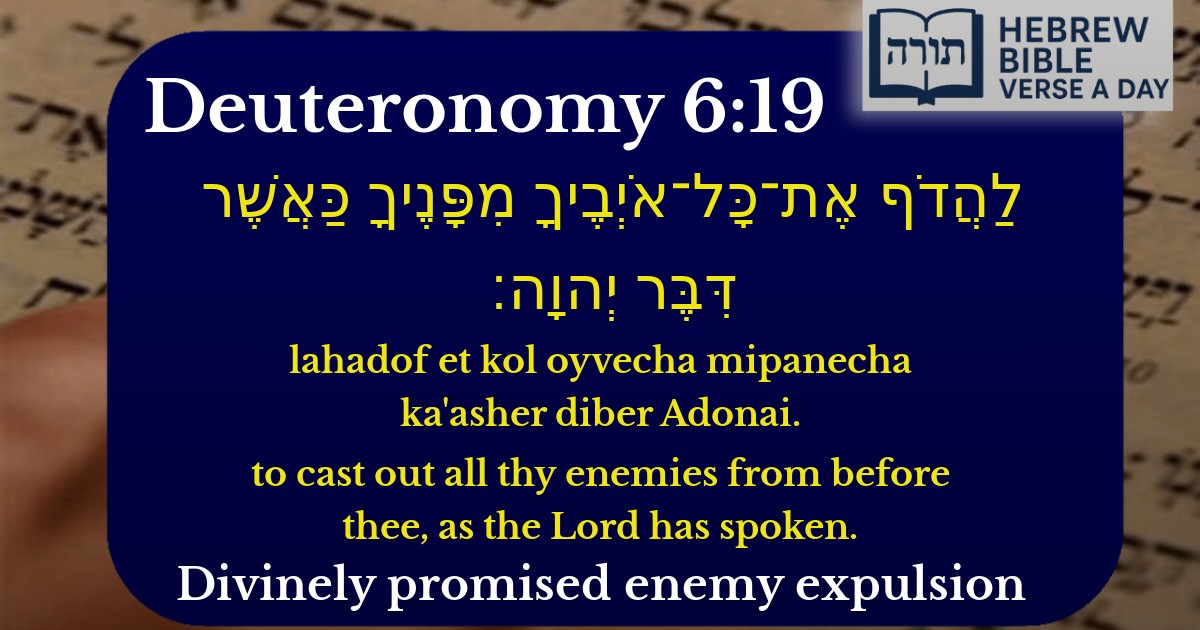Frequently Asked Questions
Q: What does Deuteronomy 6:19 mean when it says 'to cast out all thy enemies from before thee'?
A: This verse refers to Hashem's promise to help the Jewish people conquer the Land of Israel by driving out the nations that opposed them. According to Rashi, this was a conditional promise—if the Jewish people remained faithful to Torah and mitzvot, Hashem would ensure their success in battle and settlement of the land.
Q: Why is Deuteronomy 6:19 important in Jewish tradition?
A: This verse is part of the larger passage of the Shema (Deuteronomy 6:4-9), which is central to Jewish prayer and belief. It reminds us that our success against adversaries depends on our faithfulness to Hashem's commandments, as taught by the Rambam in Hilchot Melachim (Laws of Kings).
Q: How does Deuteronomy 6:19 apply to Jews today?
A: While this verse originally referred to physical enemies in biblical times, the Midrash teaches that it also applies spiritually—we must 'cast out' negative influences (like harmful desires or distractions) that prevent us from serving Hashem properly. The Sforno explains that this is an ongoing struggle in every generation.
Q: What does 'as the Lord has spoken' mean in this verse?
A: This phrase emphasizes that this promise was already given earlier in the Torah (e.g., Exodus 23:27-28). The Talmud (Berachot 4a) teaches that when Torah says 'as Hashem spoke,' it shows the reliability of divine promises—what Hashem says will surely come to pass when we fulfill our obligations.
Q: Does this verse mean Jews should literally fight enemies today?
A: Traditional Jewish interpretation (as seen in Rambam's Mishneh Torah) distinguishes between biblical wars commanded by Hashem and later defensive wars. Today, halacha (Jewish law) governs when and how war may be waged, always prioritizing peace when possible (based on Deuteronomy 20:10). The verse teaches spiritual principles about overcoming obstacles in serving Hashem.


Understanding the Verse in Context
The verse "לַהֲדֹף אֶת־כָּל־אֹיְבֶיךָ מִפָּנֶיךָ כַּאֲשֶׁר דִּבֶּר יְהוָה" (to cast out all thy enemies from before thee, as the Lord has spoken) appears in Devarim (Deuteronomy) 6:19, within the broader context of the Shema and the commandments to love and serve Hashem. This verse emphasizes the fulfillment of divine promises regarding the conquest of Eretz Yisrael.
Rashi's Commentary
Rashi explains that this verse refers to the expulsion of the Canaanite nations from the Land of Israel, as promised to the Avot (Patriarchs). He connects it to Bereishit (Genesis) 15:18-21, where Hashem establishes His covenant with Avraham, listing the nations that will be displaced. Rashi underscores that this promise is conditional upon Bnei Yisrael's faithfulness to Torah and mitzvot.
Rambam's Perspective
Rambam (Maimonides), in Hilchot Melachim (Laws of Kings), discusses the mitzvah of settling Eretz Yisrael and the obligation to remove idolatrous influences. He interprets this verse as a foundational principle for establishing a Jewish commonwealth free from spiritual and physical threats, in accordance with divine will.
Midrashic Insights
Halachic Implications
The verse is cited in halachic discussions about warfare and the sanctity of Eretz Yisrael. Ramban (Nachmanides), in his commentary on the Torah, emphasizes that this commandment is eternal, applying even in future generations when Bnei Yisrael return to their land.
Spiritual Lessons
Chassidic commentaries, such as the Sfat Emet, interpret the "enemies" as both physical adversaries and internal spiritual obstacles (e.g., yetzer hara). The verse teaches that through Torah and emunah (faith), one can overcome all challenges, as divinely ordained.